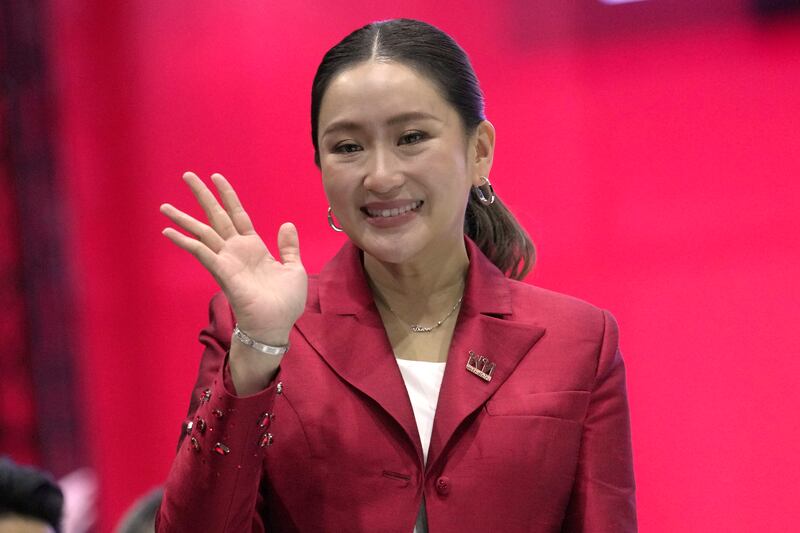This week’souster of Prime Minister Srettha Thavisin through a 5-4 decision by Thailand’s Constitutional Court, following last week’s disbandment of the Move Forward Party, entails political risk.
Royalists mistakenly calculated that with such an activist court, Paetongtarn Shinawatra, the Pheu Thai Party leader and daughter of former PM Thaksin Shinawatra, would not allow herself to be nominated, thereby creating opportunities for candidates viewed as acceptable to royalist-military elites.
Those included Interior Minister Anutin Charnvirakul of the Bhumjaithai Party, Energy Minister Pirapan Salirathavibhaga of the United Thai Nation Party, and Prawit Wongsuwan, of the Palang Pracharath Party, who was a leader of military coups in 2006 and 2014 that toppled Paetongtorn’s father and aunt.
But for any of these others to be elected prime minister would require the support of Pheu Thai, which holds 141, or 45%, of the 312 parliamentary seats in the governing coalition.
Pheu Thai was not having that, and will continue to lead the government.
For now, Pheu Thai seems intent on maintaining the coalition as it is, playing the long game.
But many in Pheu Thai feel betrayed by the repeated violations of a grand bargain that included lèse-majesté charges against Thaksin. The grand bargain, struck after the 2023 general election, allowed the military to get a seat at the table, Thaksin to return from exile.
It also enabled Pheu Thai to switch from the opposition and become a willing partner of the military-backed parties and other conservative forces. Why work with military-backed parties when unelected institutions continue to violate the grand bargain?
Because the new Senate will not have a role in electing the next prime minister, a simple majority – not the 376 supermajority – will be sufficient. That means that Paetongtarn could force either the United Thai Nation party (36 seats) and Palang Pracharath (39 seats) out of the government, assuming that the rest of the coalition holds. Though, that in itself, entails its own risks.
Power unexercised is power lost
The court’s ruling against Srettha took many by surprise.
First, he was seen as part of a grand bargain struck between Thaksin and royalist-military elites, and given the electoral realities facing the two-military backed parties that were humiliated in the polls, the least bad option.
Srettha offered no condemnation of the court’s separate decision on Aug. 8 to disband the Move Forward Party, which convinced many that Pheu Thai (the successor of two banned parties) had completely sold out to the military.
Second, his lawyer, Wissanu Krueangarm, had served as deputy prime minister in the cabinet of former army chief and Prime Minister Prayuth Chan-o-cha. The conservative royalists would not have taken on a controversial case without a nod.

Unlike their ruling that dissolved Move Forward, the court was not unanimous in its decision. It was a 5-4 decision to even accept the case, and a 5-4 verdict.
Clearly, four of the justices understood that this was a violation of the grand bargain, and that it could unleash some political uncertainty. No one from that camp wants to see Paetongtarn as prime minister, or countenance elections now that the Senate no longer has a role in electing the prime minister.
Others may have seen the hypocrisy of the ruling: Prayuth Chan-o-cha, after all, had selected Thamanat Prompow, who had been convicted by an Australian court of smuggling heroin, to his cabinet.
But the Constitutional Court ultimately ruled against Srettha, because it remains the elite's primary tool to disenfranchise the electorate that they have such contempt for. They have power and want everyone to be reminded of that.
In addition to the coups that overthrew two democratically elected governments in 2006 and 2014, it is the third time that the court has intervened and ousted a democratically elected government since 2008. Those included Samak Sundaravej and Somchai Wongsawat, both in 2008.
A weapon of disenfranchisement
The military leadership made very clear that the 2014 coup and 2017 Constitution were intended to make future coups unnecessary. Judicial coups are sufficient to disenfranchise the electorate and keep the opposition weak and unable to gain traction.
And if they cannot stop democracy, the court can keep parties on their back feet. They have dissolved five parties since 2006 alone. They have banned 21 Future Forward and Move Forward executives, and are likely to ban 44 more from political activity in a case that’s not yet decided, though the fix appears to be in. It is a judicial war of attrition.
While the elites might not be able to stem demographic and social change, they can institutionally weaken the parties, ban their most charismatic leaders, and try to force the establishment of fragile coalition governments that can be quickly brought down.
If nothing else, these court cases take time and resources.
That distracts from the business of governance. The courts seek to prevent any democratic government from starting to gain a degree of political and legislative success, which would translate into popular legitimacy.
For the military-royalist elites, there is only one source of legitimacy: The monarchy. Yet it is so weakened and insecure, that it requires the military and judiciary to defend it against the forces of democracy.
Zachary Abuza is a professor at the National War College in Washington and an adjunct at Georgetown University. The views expressed here are his own and do not reflect the position of the U.S. Department of Defense, the National War College, Georgetown University or BenarNews.
